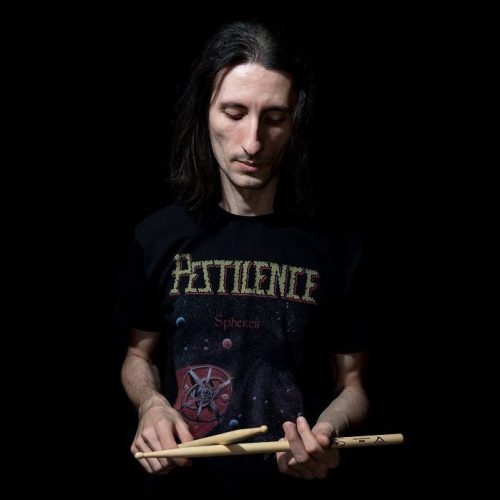
(Karina Noctum continues with her series of interviews of metal drummers, and with this one has turned in one of the most interesting, articulate, and in-depth interviews we’ve published in a long time — and we thank Romanian drummer Septimiu Hărşan for devoting so much time and thought to it.)
This is an Interview conducted with Septimiu Hărşan, who is the drummer of the Dutch Death Metal legends Pestilence and is currently working on the release of two albums, one with the Dutch masters of raw brutality Disavowed, which is one of the albums to look forward to the most within that sub-genre this year.
This in-depth interview offers insights into Septimiu’s drumming career, gear, and musical preferences, as well as some good news when it comes to Pestilence and his other bands CodeRed and Necrovile.
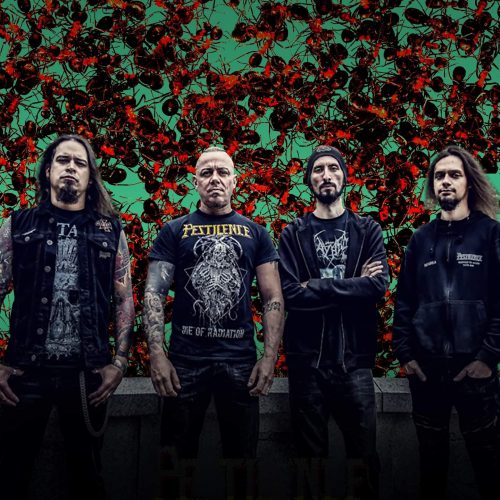
How did you come to play in Pestilence in the first place?
I used to post a lot of drumming content on my social media back at that time and Patrick Mameli was apparently following it, so at one point I got a comment from him saying something like “this is the kind of drummer that I need for my music”. I think he commented this on a Disavowed playthrough of mine and, not long from that, I was in Germany recording drums for Hadeon, Pestilence’s latest studio album. So, the short answer would be that Patrick contacted me about it.
Which genres did you play in the beginning? Who were your first drumming influences?
I grew up pretty much listening to rock and metal music (anything from Pink Floyd, Deep Purple and Queen to Metallica, Sepultura and Slayer) and, as far as I can remember, it was Metallica that made me pick up the drums in the first place.
Discovering Morbid Angel was a huge turning point for me, because then I realised I really wanted to play death metal. Also, Dream Theater with Mike Portnoy on drums and Pantera with Vinnie Paul on drums were both essential breakthroughs in my understanding of drumming and in forming my style.
Also, I began taking music theory lessons, reading lessons, classical percussion lessons, and that kind of environment exposed me to jazz and fusion as well. For years, I listened to so much jazz and fusion, I almost gave rock & metal up completely. Those were all revelations for me drumming-wise and they still are great sources of inspiration for playing the instrument… rather than blast metal, you know? There’s only so much you can learn from single strokes, I guess. Haha!
I do enjoy listening to aggressive, brutal, ugly music though, and that’s what made me come back to it after those years, but it’s more about the music than about the drumming for me.
I played many different styles along the way and would like to still do, but because my first international bands were all extreme metal, I got more well-known for that aspect of my drumming and therefore almost everyone who contacts me comes from that realm. I don’t mind it, but I don’t really consider myself an extreme metal drummer, I think I am more like an all-arounder and I am definitely planning on having musical projects where I can manifest some of the other dimensions of my playing, as time progresses.
How do you try to give it a personal touch to the drumming for a band that has such a well-established sound as Pestilence?
That’s a good question. I think over the years I’ve developed quite a refined sense of what I can do with my drumming and where the little nuances and colors and shades lie, what differences they make and so on. That allows me to navigate any music pretty easily and in many different possible ways. I can finely calibrate the amount of change that I choose to bring to an existing musical piece or part and so I can make sense of it many different ways.
It’s just a matter of consciously establishing how close I (or we, the band) choose to stay to the original song, which the fans know and like. I want to keep the songs recognizable for all the old school die-hards, so the basic structure and the main hits are all there, but then there’s some added texture and fantasy that I inject into the music as well, every now and then, so that I have fun as well. Playing the same exact thing over and over gets rather boring.
So, there are parts that I actually play that are completely different from what’s on the album, but by keeping the main kick and snare patterns similar to the original, I can afford to exercise my fantasy and musical personality without losing the audience and, many times, without most people even noticing. It’s a fine line, but it’s one I really enjoy navigating.
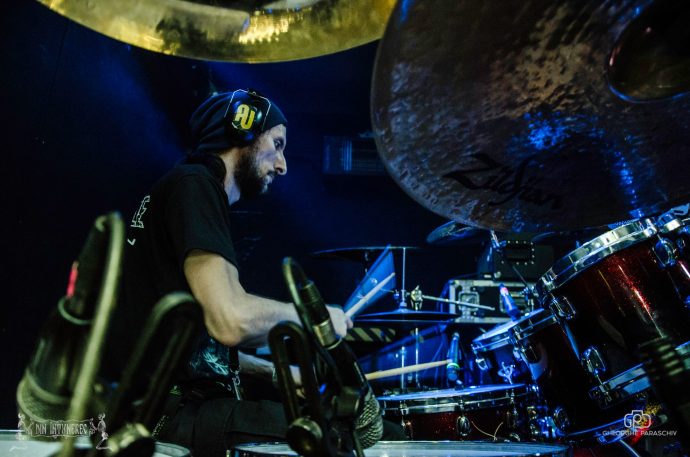
What do you do to prevent injuries?
Luckily, I’ve been taught (since my classical percussion days and also by doing tons of research on the matter) to use pretty healthy technique and, although my hands (like anything else about me, haha!) seem a bit weird, I am physically very relaxed and comfortable at the drums.
Other than that, probably the main thing is always trying to carry around the smallest amount possible. Load in and load out are the most dangerous things drummers can do along their drumming life, so I try to stay away from abusing my body with that as much as I can, especially in long touring situations.
Also, I don’t do any sports at all, which doesn’t neccesarily sound healthy but it keeps me safe from the usual accidents most people have had at least a few times in their lifetime.
That being said, a few years ago I did have a wrist injury, which was not related to drumming but which caused considerable pain in my left wrist when playing. I did a full six-week South American tour like that and wore wrist bands and played everything from my arm exclusively, trying to keep the wrist from moving, and I made it, but it’s never recovered completely. Even now, when I play the faster stuff, like Disavowed or Necrovile, I sometimes get pain in my left wrist.
Tell me about the gear you are using?
My endorsements right now include Zildjian cymbals (a mixture of K Zildjian, K Custom, A Custom, A Zildjian and EFX series), Vater drumsticks (my main sticks are the hickory 5B wood tips), Axis pedals (the A Longboard model) and FootBlaster for triggers.
For a drummer of my notoriety (or lack thereof), who’s almost never playing his own kit, I feel a drum endorsement is usually more of a pain in the ass than something useful, so I’ve so far stayed away from endorsing any drum company. But I do have to say I love my Yamaha and Mapex drumkits and also my Pearl snares.
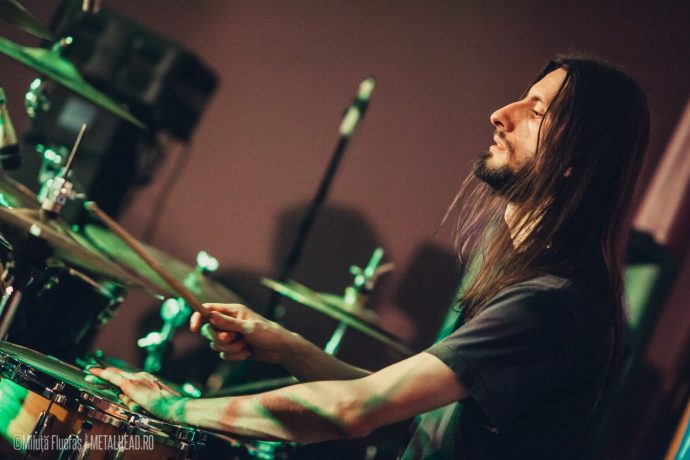
What other musical projects are you working on these days?
I am still a member of most bands I played with before Pestilence. Disavowed, Necrovile, and CodeRed are all working on new material. The Disavowed album is supposed to come out really soon and it’s gonna be insane, that’s a promise! I’ve also just recorded the drums for the new Necrovile album too, and the rest of the guys will soon start recording their parts. Very difficult stuff to play, haha! CodeRed, my first death metal band and the one for which I am a co-writer beyond the drums, is also working on a new album for which I am proud to say I’ve already written a full song, guitar-wise. All of these three materials will be glorious death metal albums with rather intense drumming, I’d say they’re all definitely worth checking.
I’m also working with Nader Sadek, among many other great musicians whom he’s alternating depending on their/our schedules (Nader is the only constant member of the project, haha!), and that’s also a great pleasure because the guy is great and super easy-going and the music is awesome… and he’s also working with one of my heroes, Mr. Derek Roddy! We plan to do nice things together.
I’ve also recently joined some exciting new projects that I cannot talk about just yet but we’ll make it official as soon as everything clicks into place.
Any news about upcoming releases or tours with Pestilence?
The plan is that I record the drums for the new album in May. We’ll see how all that will work out given this Coronavirus insanity, which makes traveling really uncertain, but so far, this is what the schedule says. Of course, we’ve got lots of shows planned and hopefully we’ll get to do most of them. Unfortunately, as you already know, travel restrictions have forced us to indefinitely postpone our spring tour in the Americas (USA, Canada and Mexico) which we were supposed to co-headline with Possessed. Public health first though, I’d say.
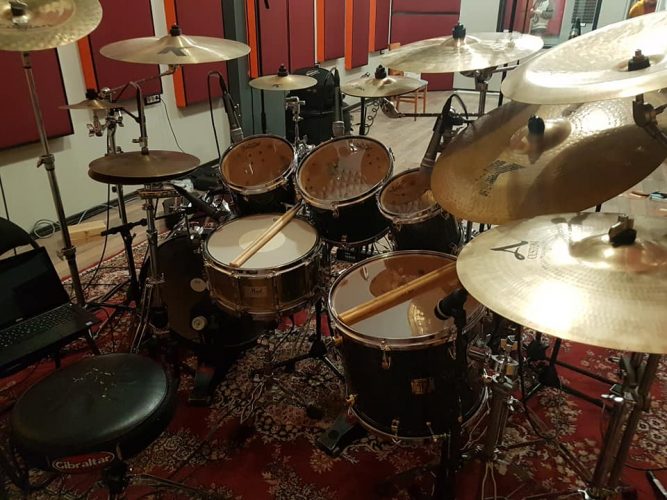
I noticed you were setting a drum kit that was made of a particular kind of wood. Tell us more about it.
Yes, I guess you’re talking about my Yamaha Maple Custom drum kit. Maple is one of the most commonly used wood types for high-end drum shells, nothing remotely as exotic as bubinga or any of the other crazy stuff that’s become so trendy nowadays, but I still feel the clarity of tone and the combination of attack and body and decay that maple shells possess are second to none. And out of the maple drums that have ever been produced, I’ve been especially in love with this Japanese model from the ’90s which they simply called the Maple Custom. Easily recognizable kit because it had golden lugs. Also some of the most expensive drums you can find on the market, irrespective of their state. And although I do think ultimately a drum is a drum and companies overstate the differences in their top lines and, therefore, they overprice them like hell, I truly think the sound of these Yamaha Maple Customs is as close to ideal as it gets, especially in the tom department.
Anyway, I could talk and nerd out about them for hours and pages. Bottom line, it’s always been one of my dream kits. By the way, both the new Disavowed album and the new Necrovile album are recorded on Yamaha Maple Custom drums and a Pearl Free Floating Brass 14″x6.5″ snare, which is my main snare for pretty much anything I do.
What are some of the techniques you have found difficult to master?
Not sure, to be honest. I guess my thought processing doesn’t really work along those lines. I’m not a great practicer, I’m not disciplined at all, my approach is rather hedonistic and I can only do things that I like, otherwise I can’t focus and I get blocked in the process. I suppose that’s why I chose this job, haha!
If I were to come up with an answer, I’d probably say the hardest thing for me is to stop thinking while playing, because I have a natural tendency to overthink and rationalize and, you know, playing doesn’t really work like that, it requires more of a meditation-type state, a zone that you need to enter where you more or less stop thought processes or watch them from a distance. Or just ignore them completely. So that’s a skill I’m still working on and I feel it’s really difficult to grasp.
What do you prefer to listen to in your spare time, and how does it influence your drumming?
This is the question that always makes me feel old inside (although I’m only 32): I don’t have the urge to search for new stuff all the time, like some people do. I’m a very conservative type of listener. I’m rather obsessive in most of what I do, including music listening, and it’s virtually impossible for me to get bored of the classics. So in short, I prefer quality to quantity. I don’t need lots of music, I need high-standards music, something that cannot possibly get old or bore me.
I’m mostly a ’70s and ’90s guy. I think the ’70s were really special in many ways, one of them being that the musical space that is nowadays defined by a genre was back then defined by a band or artist. Does this make sense? I mean, all those big guys back then were so uniquely themselves and copying someone else seemed so sacrilegious that you could say each of them basically played their own separate genre — they were sui generis acts.
You know, if you ask yourself what genre did Pink Floyd or Queen play, it’s not easy to answer. Or who else plays those same genres. And they weren’t try-hards either, they were just immensely talented and, very important, unbiased in their artistic views. That attitude is so inspiring. But culture and music culture were different back then. Nowadays I feel it’s more about genres than about individual class-A artists and… to me, the genre can be defined, in great part, as “cases of plagiarism” rather than something I would feel the urge to explore. I tend to pick the few best (for me) from each style and that’s about it.
Let me philosophize about just one little thing here. The other day, I was watching this Chick Corea interview and he was saying that being creative is the natural human state and that people who are not creative have lost their given human nature to dull maturity, to stressful responsibility, and so on. He also suggested there would be a lot less war-mongering and bombing and hatred and frustration and tragedy and suffering in the world if more and more people would pick up artistic endeavors and follow their natural creativity. I think that is a deep, beautiful thought and I expected nothing less from Chick, who’s one of my all-time biggest heroes.
But here’s the trick: on the one hand, most people are not in touch with their true creative side to begin with, even when they think they are. The fact that you like music doesn’t necessarily make you a talented musician. Same with any art. Many times, by the time you discover the beauty of art and the existential need for it and the therapy and meaning that it brings in people’s lives, you’ve already buried your native proclivity towards truly creative endeavor, because the world does that to you very quickly, and reclaiming the child inside requires giving up on everything you’ve ever been taught and living a life upside-down from all you’ve already built — in other words, it’s virtually impossible for most people.
So, as much as I agree with Chick, on the other hand, I actually feel like there’s too much music and most of it is made by people whose creativity was long-buried. So, because of that, too much of it is bad or uninteresting or vaguely good, but not truly inspiring. The really good stuff is rare, for me at least. I enjoy very little music, I’m not the kind of person who would listen to lots of stuff, by any means. Sometimes I joke and say that I don’t like anything, haha!
The point is I don’t need constantly new stuff to feed my musical ideas, I just need good stuff. I don’t get inspired by how new something is to my ear, but by the genius in it, the emotional intensity and the attitude towards music, so in that sense, getting old with my music is still pretty safe in terms of keeping me inspired, I hope.
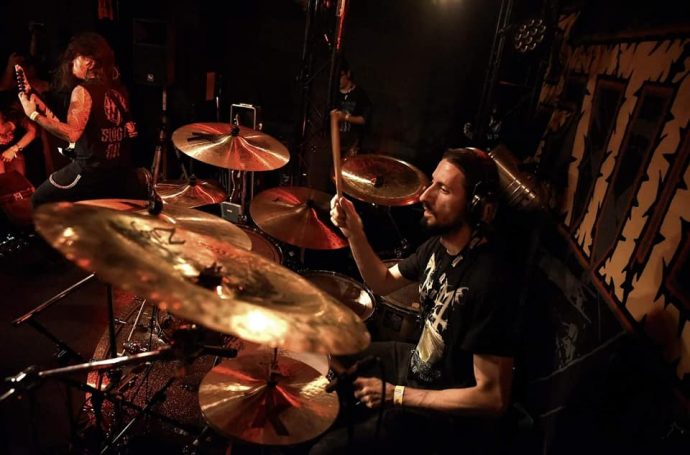
Describe your dream custom made drum kit
I think the kit that I am using nowadays is pretty much everything I would need in terms of expressing myself — a Yamaha Maple Custom fusion-style configuration but with 2 bass drums (I need to find a matching Maple Custom secondary kick though for the metal parts, right now all kick drums I possess are different models), a wide array of high-end Zildjians, Axis pedals, my great Vater sticks, FootBlaster triggers for the uber-fast double bass… maybe I would add some more percussion around the kit, some octobans, some bongos, some more blocks and cowbells, which I am actually planning to do. But for the most part, my current kit is pretty much the deal already.
When it comes to new bands? Are you up to date, do you like any band in particular?
Not too much, when it comes to metal. Many people are surprised when I say this, but in the latter years I haven’t been doing much research, in all honesty, except for some jazz artists. I don’t congratulate myself about it, I think it’s a symptom of getting old on the inside and a side effect of my hearing getting tired. But there’s so much music and loudness in my ears on the road that I’ve come to enjoy silence a lot more nowadays, when I am at home. I hear new bands all the time in festivals or on social media, but I forget them as soon as they (or the clips) finish playing.
For bands of the 2000s, Ulcerate, Leprous, Fallujah and Mastodon are probably the first four names that quickly come to my mind. Not particularly new though, haha!
How should Death Metal develop further?
I’m not very sure death metal should develop at all, to be honest. I’ve already stated my opinion about genres and I think death metal is no exception, haha! I also don’t think just becoming faster and more technical necessarily adds a lot of true quality to the music. It is fun and enjoyable, especially for musicians, but ultimately I feel like it’s more of an ego-oriented trait in music. It’s surplus value for instrumentalists, mostly.
Staying old school and true to the roots also seems a bit ridiculous for new bands — I’d call it a no-go — so I guess my only solution for developing the style would be less copying and less generic-thinking people so that the few truly creative people can shine brighter. One of the great things about rock and metal (and jazz too, for that matter) is that they always motivate young people to pick up an instrument. But there’s also bad news in the good news, because most of those will invariably be creatively mediocre.
Personally, at this stage, I’m not so much for developing the genre, any genre, but more for being uniquely creative and special without thinking in terms of taxonomy. The ’70s way, you know? That’s what I’d truly like to see (and do!) with music. But then again, I can’t truly demand that from other people since I’m not finding the time myself to attempt it with a personal project. My songwriting is too fragmented and incoherent, my hearing too tired, and my time too chopped into pieces, so right now, I don’t feel satisfied enough with anything I wrote by myself in my room back home, in between my regular death metal jobs. Haha! I haven’t given up though, I just need to focus more and get more time on my hands for it.
What are your ambitions as a drummer? What is it that you have not yet achieved but you aim to?
Well, in your mind, you’re never good enough as a drummer and we know that everything you discover makes you more aware of what you don’t know or of how badly you suck at certain other things. So the journey of a drummer is a never-ending story in terms of ambitions and having higher ends to aim at. You can always get better, by any criteria of the craft. Or less bad, at least.
How important is to preserve the old school sound? What to do in order to preserve the old school sound?
It’s not a particular goal of mine to preserve the old school sound. My take on it is that what you feel is what will come out. If you’re old school enough at heart, you will sound old school. Or, putting it differently, if enough of your heart is old school, if you understand and enjoy and are able to get inside music that is old school, then you can then make it happen when it’s time to play it. But I don’t think people should force things unto themselves just because of either money or because their social group is into certain styles of music or anything like that. I think, in the arts, you should really follow the calls of the depths of your soul, not any exterior demands or pressures. Music should be the voice of the soul, as someone once said.

Dude seems extremely nice! Good interview.
Richard Starkey (Ringo)n played Ludwig Maple “Hollywood” Drum Set !
This was great. Thank you for interviewing drummers!